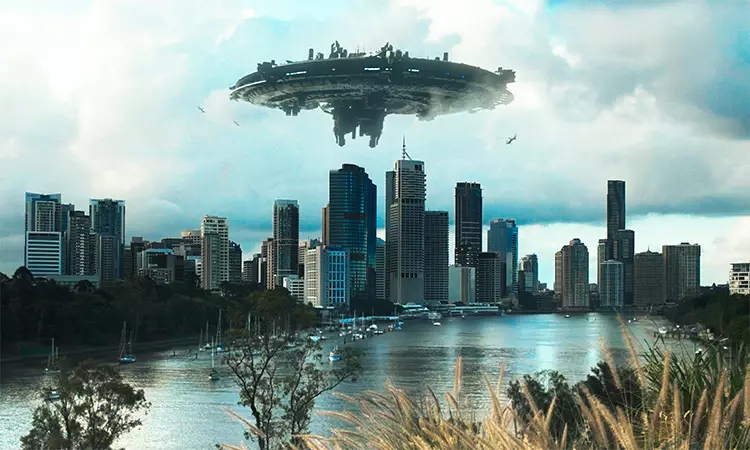The cinematic landscape has always been a reflection of societal fears and anxieties, morphing to suit the ever-shifting tides of public consciousness. Brian Hanson’s “The Bunker” serves as a poignant exploration of these themes within the framework of a science fiction narrative that intertwines the psychological with the extraterrestrial. Evoking a striking atmosphere amid existential crises, this film challenges viewers to grapple with the reality of isolation, alien invasion, and the nature of authority, all while setting the stage for an exploration of feminine resilience against chaos.
In “The Bunker,” audiences are thrust into a dystopian reality where colossal alien spacecraft loom over Earth’s major cities, prompting a militarized response. Five scientists, alongside a military commander, are sequestered in isolated bunkers, forced to collaborate via a closed-circuit communication system. Their mission is daunting: develop a bioweapon tailored to eradicate the ominous ‘Travelers’ while safeguarding humanity. This inciting premise centers on a fundamental question that resonates throughout the film: how does one determine whether a foreign entity is a foe or a friend? This dichotomy captures the essence of Hanson’s work, positioning it squarely within the conversations surrounding fear-driven responses to the unknown.
Hanson deftly draws parallels between the alien encroachment and the severe emotional turmoil arising from the shared global experience of lockdown during the COVID-19 pandemic. Here, Michele Riley, a microbiologist portrayed by Chelsea Edmundson, embodies the struggle of isolation – a struggle that twists her reality in disturbing ways. As her circumstances devolve into a psychological nightmare, viewers are immersed in an exploration of solitude and its consequences, an allegorical nod to the persistent anguish perceived during our recent societal lockdowns.
The Descent into Madness
Michele’s character arc provides a rich canvas for analyzing mental health, authority, and the intimate battles one faces within the confines of a patriarchal framework. Her hallucinations of gore and conversations with imagined figures such as her father reveal an unraveling psyche in response to both external tensions and internal demons. The casting of horror icons Tony Todd and Tobin Bell adds layers of dread, portraying not merely figures of authority but embodiments of Michele’s spiraling turmoil.
As the film unfolds, Michele’s colleagues emerge as agitating forces that reflect her insecurities and fears, revealing the distinctive relational dynamics often experienced by women in predominantly male fields. The resulting tensions shift the narrative focus from the impending alien threat to a more profound examination of Michele’s interpersonal struggles, creating a unique blend of psychological thriller and science fiction drama.
Hanson further amplifies the ambiguity surrounding Michele’s mental state. Is her descent into madness a result of cabin fever bred from isolation, or is it a manifestation of an insidious external influence? The narrative expertly straddles both possibilities, leaving viewers questioning the nature of her alienation – be it self-inflicted or orchestrated by external forces. This multifaceted exploration elevates “The Bunker” beyond a mere science fiction tale, presenting it as a complex commentary on the human condition when faced with insurmountable challenges.
Michele emerges as a feminist heroine, standing resolute in a world dominated by patriarchal figures. Her journey encapsulates the struggle for identity and agency amidst her male-dominated environment, weaving together themes of empowerment and resilience. In a narrative infused with elements of allegory, Michele’s character evolves from a figure of conflict to one of liberation, as she ultimately learns to trust her instincts and carve her own path amid chaos.
The emotional and psychological dimensions of “The Bunker” resonate not only within the context of the plot but also as a powerful reflection of current societal dynamics. With its emphasis on mental health, autonomy, and feminist resilience, Hanson’s film resonates with audiences, prompting critical dialogues about authority, isolation, and the nature of the human spirit when confronted with the unknown.
“The Bunker” stands as a thought-provoking exploration of alien invasion tropes intertwined with pertinent psychological themes, fear, and identity. Brian Hanson successfully crafts a narrative that invites viewers to engage deeply with their own fears while examining the resilience of humanity, especially the women among us, in the face of overwhelming odds. This film not only entertains but also challenges, making it a significant addition to the science fiction genre and contemporary discussions around gender, authority, and isolation.

